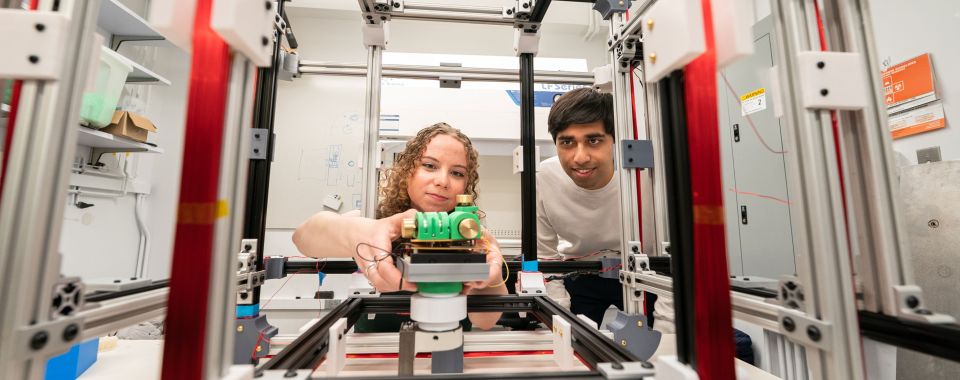ABET was founded in 1932 and accredits more than 660 colleges and universities in 23 nations that offer more than 3100 programs. Our departmental programs in Aerospace Engineering and Mechanical Engineering have met the required educational standards and objectives of the Engineering Accreditation Commission of ABET since their inception.
The undergraduate program in Aerospace Engineering is accredited by the Engineering Accreditation Commission of ABET under the General Criteria and the Program Criteria for Aerospace and Similarly Named Engineering Programs.
The undergraduate program in Mechanical Engineering is accredited by the Engineering Accreditation Commission of ABET under the General Criteria and the Program Criteria for Mechanical and Similarly Named Engineering Programs.
Most undergraduate students in the department elect to complete both the Aerospace Engineering and Mechanical Engineering programs.
Aerospace Engineering Program
Educational Objectives:
-
Our graduates will think critically and creatively and excel in applying the fundamentals of aerospace engineering.
-
Our graduates will pursue a life of curiosity with a desire for learning and have the ability and self-confidence to adapt to rapid and major changes.
-
Our graduates will advance toward leadership in shaping the social, intellectual, business and technical worlds and by excelling in diverse careers.
Students who successfully complete our Aerospace Engineering program will have satisfied the following ABET Program Outcomes:
-
an ability to identify, formulate, and solve complex engineering problems by applying principles of engineering, science, and mathematics
-
an ability to apply engineering design to produce solutions that meet specified needs with consideration of public health, safety, and welfare, as well as global, cultural, social, environmental, and economic factors
-
an ability to communicate effectively with a range of audiences
-
an ability to recognize ethical and professional responsibilities in engineering situations and make informed judgments, which must consider the impact of engineering solutions in global, economic, environmental, and societal contexts
-
an ability to function effectively on a team whose members together provide leadership, create a collaborative and inclusive environment, establish goals, plan tasks, and meet objectives
-
an ability to develop and conduct appropriate experimentation, analyze and interpret data, and use engineering judgment to draw conclusions
-
an ability to acquire and apply new knowledge as needed, using appropriate learning strategies
Mechanical Engineering Program
Educational Objectives
-
Our graduates will think critically and creatively and excel in applying the fundamentals of mechanical engineering.
-
Our graduates will pursue a life of curiosity with a desire for learning and have the ability and self-confidence to adapt to rapid and major changes.
-
Our graduates will advance toward leadership in shaping the social, intellectual, business and technical worlds and by excelling in diverse careers.
Students who successfully complete our program will have satisfied the following ABET Program Outcomes:
-
an ability to identify, formulate, and solve complex engineering problems by applying principles of engineering, science, and mathematics
-
an ability to apply engineering design to produce solutions that meet specified needs with consideration of public health, safety, and welfare, as well as global, cultural, social, environmental, and economic factors
-
an ability to communicate effectively with a range of audiences
-
an ability to recognize ethical and professional responsibilities in engineering situations and make informed judgments, which must consider the impact of engineering solutions in global, economic, environmental, and societal contexts
-
an ability to function effectively on a team whose members together provide leadership, create a collaborative and inclusive environment, establish goals, plan tasks, and meet objectives
-
an ability to develop and conduct appropriate experimentation, analyze and interpret data, and use engineering judgment to draw conclusions
-
an ability to acquire and apply new knowledge as needed, using appropriate learning strategies
Undergraduate Graduation and Enrollment Data
Updated: June 2025
| Class Year | Mechanical | Aerospace | Mechanical & Aerospace (combined program) |
Undeclared | Total |
|---|---|---|---|---|---|
| 2020 | 15 | 1 | 36 | 52 | |
| 2021 | 16 | 4 | 37 | 59 | |
| 2022 | 18 | 2 | 33 | 53 | |
| 2023 | 14 | 2 | 29 | 45 | |
| 2024 | 11 | 3 | 23 | 37 | |
| 2025 | 14 | 4 | 30 | 48 | |
| 2026 | 16 | 1 | 51 | 68 | |
| 2027 | 18 | 6 | 37 | 61 | |
| 2028 | 86 | 86 |
